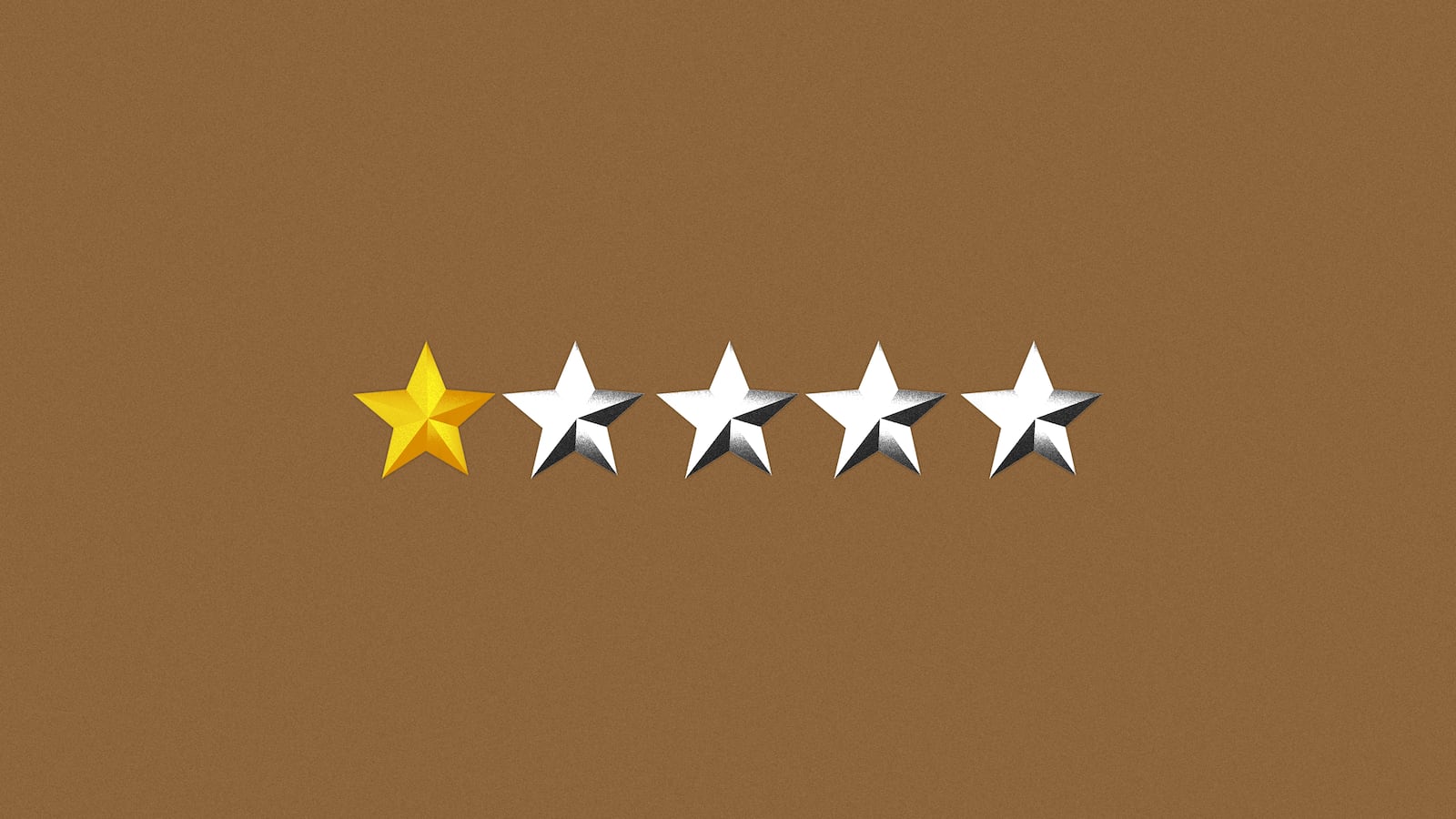The author space on social media blew up last week after a fresh wave of review-bombing targeted debut authors’ books.
The latest campaign came after writer Cait Corrain broke her silence in an interview with The Daily Beast after she was exposed writing negative reviews that mostly impacted authors of color.
Corrain, a white author who was supposed to make her novel-writing debut this year, attributed her antics to psychosis-induced substance abuse. However, her colleagues are not buying the reasoning, with many saying it’s hard to bounce back—professionally and emotionally—from being targeted in an industry that nurtures systemic racism.
After issuing an apology in December for pummeling books with review-bombs, Corrain had been radio silent for two months.
Then, Corrain had an exclusive interview with The Daily Beast, and authors on Goodreads were—once again—bombarded with oddly timed negative reviews.
In documents shared between authors and reviewed by The Daily Beast, new Goodreads accounts were created on Feb. 4—just days before Corrain’s interview—and gave a slew of reviews until they were taken down around Feb. 16.
“Someone has been one-starring our books, the same people that were attacked last time,” Black American author Akana Phènix, formerly Akure Phènix, told The Daily Beast.
“This is personal,” said Phènix, the author of the upcoming Empire Wars. “I don’t know what they have against me. … I’m not the kind of person who would do this to anyone. I know how hard it is to write a book. I know how hard it is to even do anything, and as a Black person—as a human being—to put your work out there.”

Akana Phénix
Courtesy of Akana PhènixOne recent Goodreads account that had been accused of review-bombing had noted that it read over 2,500 books, many including children’s books, classics, and then others by 2024 debut authors.
“We’ve seen so many people come out trying to defend [Corrain] now,” said R.M. Virtues, an Afro-Indigenous Greek mythology author who had been review-bombed previously and again more recently. “So, it could have been somebody doing that. It could have been somebody thinking they could do the same thing as [Corrain] and get clout. Nothing would surprise me at this point.”
However, despite who may be behind the negative reviews, authors are fed up. They say they’re tired of Corrain making what they see as excuses related to her mental health, her autism and substance abuse problems to justify racist acts.

R.M. Virtues
Courtesy of R.M. VirtuesCindy RX He, the Singaporean author of the upcoming thriller Perfect Little Monsters—which was also review-bombed, said she is “disgusted by the way [Corrain] is harming autistic people with her claims.”
“While I hope that she is getting the help that she clearly needs, I was shocked and disappointed to read what she had to say in the article,” He said about the Corrain interview.

Cindy RX He
Courtesy of Cindy RX HeHe added that Corrain attempted to “deflect responsibility” while “attacking POC authors.”
“Furthermore, as an autistic person I do not appreciate the way she’s trying to use autism as an excuse to justify her actions,” He told The Daily Beast. “I am autistic, I am socially awkward, and I have difficulty understanding social cues and I have no filter when I speak, but I don’t try to sabotage other people by doing shitty things to them. Autism doesn’t make a person racist, or an asshole who hurts other people on purpose. The harm she is doing with her narrative to autistic people and people with mental illnesses, who already face so much stigma, is enormous.”
In a request for comment, Iron Widow author Xiran Jay Zhao, who is Asian Canadian and posted about Corrain’s Goodreads messiness in December, directed The Daily Beast to a new post they made about the former 2024 debut author.
“My issue is that Cait keeps saying that they’re not using their mental health as an excuse for what they did, except that’s exactly what they’re doing by insisting that it was the medication that caused them to behave in the way they did instead of subconscious racial biases,” Zhao said in a TikTok.
@xiranjayzhao Can't believe we gotta go through Review Wars III: Return of the Racist #booktok #caitcorrain ♬ original sound - Xiran Jay Zhao
In an exclusive interview with The Daily Beast last week, Corrain admitted that she created accounts on Goodreads, a book website under Amazon; however, she said that the mixture of medications and substances caused her to experience blackouts and she could not exactly remember her actions.
Corrain said that she juggled a mixture of medications before landing on Zoloft, BuSpar, Vyvanse, intravenous Ketamine, Trazodone, and Lamictal for issues relating to severe depression, anxiety, and ADHD while working on her then-upcoming novel Crown of Starlight. She also said that she self-medicated with alcohol, cannabis, and caffeine.
During psychotic breaks, Corrain said she unconsciously targeted books that were in competition with her own, mostly books that were in the science-fiction or fantasy genres by other authors who were supposed to debut in 2024. The fact that most of the authors of the books she review-bombed were of color was a “sheer, awful coincidence.”
“I want to just be extraordinarily clear that race had absolutely nothing to do with the authors that I chose to go after,” Corrain told The Daily Beast. “The fact that there were a large number of people of color amongst the authors that I targeted is an unfortunate coincidence that happened because I was going off of Goodreads lists.”
The largest barrage of reviews came in December 2023.
“I became increasingly paranoid that I was being set up to fail,” Corrain told The Daily Beast. “By that point, I was starting to experience what’s called a medically-induced psychotic break. And psychosis is when you are completely disconnected from reality. And so the logic of all of this, if it doesn’t make sense to you, it’s because it doesn’t make sense—period—to anybody who is not in it.”
A group of authors who had been affected by the low ratings put together a lengthy document to show the books that had been hit. At first, Corrain denied that she was behind the reviews, and the document—shared on TikTok by Zhao—included screenshots from a Discord conversation Corrain allegedly had with her friend “Lilly” who was supposedly behind the reviews.

Cait Corrain
Courtesy of Cait CorrainAt first, Corrain denied that she was behind the reviews, but she eventually came clean that “Lilly” was not a real person in an apology she issued on social media on Dec. 12.
Corrain was dropped by her agent at Rees Literary Agency, publisher Del Rey Books, and book distributor Daphne Press.
According to Dr. Kimberly Sanders, M.D., who focuses on adult psychiatry, the medications Corrain said she took had the chance of spurring periods of psychosis.
“A lot of these medications are kind of conflicting, and some of them on their own can be hallucinogenic or can cause more confusion or psychotic symptoms,” she told The Daily Beast. “Psychosis is basically a break from reality.”
She said she’d expect someone on that list of medication to not be “functioning well.”
“I would expect them to be probably confused,” Sanders said.
She added that she wasn’t sure if the person would be able to carry out something as complex as targeted review bombs.
“I would expect them to likely have poor judgment,” said Sanders.
Arron Muller, a racial trauma therapist based in New York, said that even if Corrain may not have fully been of sound mind while she dished out the reviews, there could have been an inkling of “intention” to harm authors of color.
“Sometimes, things that lay dormant or feelings that we have can come out,” he said. “There could be covert biases that [Corrain] has. We learn that we all have ideologies, we all have stereotypes, we all have biases around people and sometimes that can come out.”
Zhao pointed out a similar concept in their TikTok post, that racism does not have to be conscious and “can look a lot more insidious.”
“Plenty of us take the same medications for the same sorts of reasons, and we don’t ever think to sabotage our peers,” Zhao said. “If you’re more concerned at being called a racist than racism itself, that is an active hindrance to dismantling racism… If they are truly as committed as being not racist as they say, they would’ve realized the harm in disproportionately targeting authors of color… You have to recognize when you are reinforcing unequal racial dynamics.”
Despite the raucous Corrain caused on the surface level within the publishing community, authors of color continue to reel from mental anguish themselves.
“This Cait stuff has caused harm that, to this day, I cannot begin to fully fathom,” said Neka Marie, who is Black American and the author of The Inevitability Of: Death's Gate.
Though Marie was not targeted in the review bombs, she considers herself to be “close to a lot of the people [Corrain] purposefully sought out and harassed and continues to harass to this day.”

Neka Marie
Courtesy of Neka Marie“We’re tired of justifying our existence in a space while others just get to exist,” Marie said. “We’re tired of seeing someone commit heinous, racist acts and be coddled because we weren’t submissive enough in our demands for justice. We’re tired of seeing the most mediocre SOMEHOW set the standard while we must be beyond excellent just to be seen. Folks is tired.”
Though authors of color were proud of the agency, publisher, and book distributor for dropping Corrain, they also questioned why those companies didn’t do more for the communities that were impacted.
“The rest of publishing has really been quiet about it,” Virtues said. “Have we heard anything about how they're helping the rest of us? No.
“How many white books do you think there are on Goodreads as opposed to Black books? Because I know me and my writing community, we kind of got to look to find Black books,” Virtues added. “So, to sit there and say [race] had nothing to do with it when we can look at everything on the table, I just don't like being lied to and I don't like being gaslit.”
In a request for comment regarding inconsistencies with Goodreads accounts, whether or not Corrain sent direct apologies to people she hurt in her reviews, and if she had any knowledge of the new reviews plaguing authors, the writer instead offered a self-loathing reflection.
“As I sit here in the wreckage of my life, I am trying my best to piece together what happened and apologize to all who were wounded or offended by my actions,” Corrain wrote in a statement. “I know what I did was inexcusable; I wish there was some way I could take it all back. I fully own and deeply regret the hurt I caused other people, in particular to authors of color. While intensely frightening to do so, opening up about my long-term mental health struggles was an attempt not to excuse, but to explain what I did. Any gaps or inconsistencies in my accountings of what happened reflect that I was in a state of acute psychotic derangement and simply can’t fully remember many specific details.
“The painful reality is that I was experiencing a profound mental health crisis throughout much of the past two years, gravely aggravated by serious substance abuse. If I had been mentally stable and sober, I would have believed in my own work—and not allowed my fears and insecurity to drive me down such a toxic, self-destructive path. I am not asking for sympathy; I’m just trying to help people understand what happened. If my attempt to do so falls short, I am, once again, so profoundly sorry. In the meantime, I’m committed to do everything within my power to make amends for my past misdeeds and live a productive and worthy life going forward,” she said.








